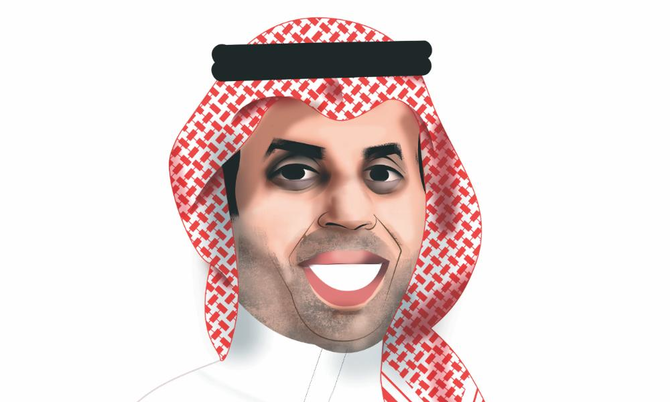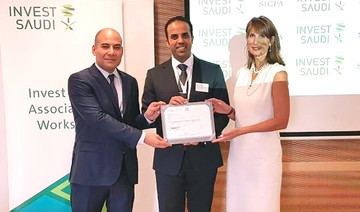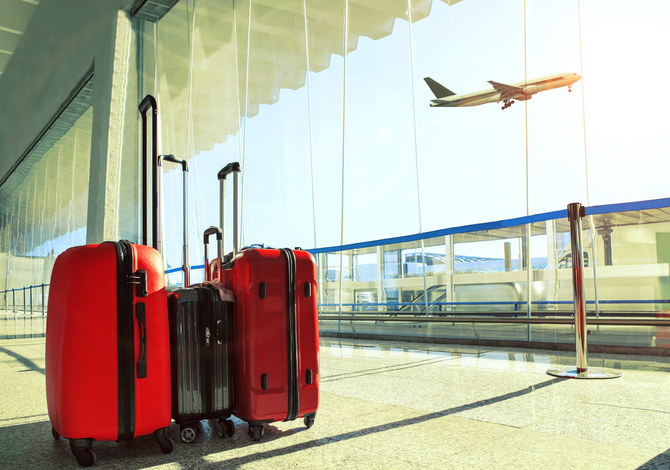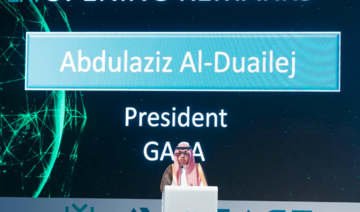DAVOS: Saudi Arabia is open for business, and wants the world to be involved in the multibillion-dollar transformation underway in the Kingdom as part of the Vision 2030 strategy.
That was the message from Ibrahim Al-Omar, governor of the Saudi Arabian General Investment Authority (SAGIA), to leading decision-makers at the annual meeting of the World Economic Forum (WEF) in Davos, Switzerland, last week.
On the sidelines of the event, Al-Omar told Arab News that there had been “huge” interest from international investors to be partners in the strategy to diversify the economy away from oil dependency.
SAGIA is the main facilitator and promoter of foreign investment into the Kingdom, and Al-Omar said recent figures had shown that international businesses were enthusiastic about the Saudi transformation.
He pointed to a near-doubling of registrations by foreign companies in 2018, and a 127 percent increase in foreign direct investment (FDI), as proof of Vision 2030’s attractiveness for global investors.
“The numbers talk,” he said, while outlining SAGIA’s future plans to attract more business to the Kingdom, with the opening up of new sectors — in education, health care and transport — to foreign investment; the privatization of large parts of the state-dominated economy; and the “megaprojects” underway in Saudi Arabia such as the NEOM development, the Red Sea Resort, and Al-Qidiyya entertainment complex outside Riyadh.
Al-Omar made it clear that the effects of Vision 2030 go way beyond economic diversification.
“We’re in a massive transformation on a scale that has never been seen before. Our transformation is a once-in-a-lifetime opportunity, and we’re changing economically, socially and culturally,” he said.
--------
BIOGRAPHY
EDUCATION
• King Fahd University Of Petroleum and Minerals
• Leadership Development Program, Harvard University, US
CAREER
• VP, Saudi Telecom Business Unit
• CEO, Viva Bahrain
• Chief Development Officer, Mobily
• Governor, SAGIA
--------
“We’re three years into a 15-year journey to transform and diversify our economy, and we’re doing that with such speed because we have a can-do, make-it-happen attitude.”
SAGIA is the main agency for pulling foreign business into the Kingdom, but it is more than just a licensing organization.
“Our role isn’t just about licensing, because today you can get your license online in about two hours,” he said.
“We’ve revised our regulations, and extended the license period from one year to five years to make it easier for the investor,” he added.
“The role of SAGIA is... to work with investors to make sure they have a seamless experience in doing their business in Saudi Arabia.” The organization has drawn up a schedule of 500 reforms to improve the business environment, and has so far acted on nearly half of them.
“We managed to reduce the customs clearance period from two weeks to 24 hours, and we also changed our procurement laws to encourage investors to localize and manufacture in the Kingdom,” he said. “The (previous) criteria process … was that if you passed a technical evaluation into your commercial proposal, the cheapest tender would get the project. Not anymore. Now it’s not the cheapest. Now another criterion has been added to the evaluation: Local content. It has a weight on the criteria. It’s like the carrot, it’s not by force, so investors can charge even more to win the project.”
---------
KSA launches plan to attract $427 billion in investment
---------
Special attention was paid to the small and medium enterprise sector. “We’ve launched Meras, an electronic platform connecting all the government entities needed to start your business. We’ve managed to reduce the time to establish your business from 18 days to 20 minutes. It’s all done online, which makes it very easy,” Al-Omar said.
In addition, new corporate legal structures have been introduced to streamline the business sector.
“We’ve established an insolvency law, a commercial arbitration center and a commercial court. There are a lot of changes in the investment environment,” he added.
New business sectors have been opened up to foreign involvement. “Recently, we opened the health sector. Before it was only hospitals, but now it’s also clinics and primary facilities that are allowed for foreign investors,” Al-Omar said.
In education, foreign investors who were previously restricted to involvement in universities and higher-education facilities can now get involved in the full school range, from kindergarten to high school. In transportation, “last mile” operations, previously closed to foreign involvement, have also been opened up.
“All this has happened just in the last three months, on top of changes that came before, because we’re changing very fast,” the governor said. “We opened the education sector too in the last three months, so that’s health, education and transportation in a short space of time.”
He has also identified a set of what he called “untapped” sectors as opportunities for further foreign investment.
“If we look at untapped sectors like tourism, 500 entertainment companies have been established in one year. We created more than 20,000 jobs, and the entertainment authority held 3,200 event days with more than 19 million visitors. Tourism is a big thing,” he said.
Other new sectors include energy renewables, where the Kingdom will increase its energy mix over the next decade.
There are plans to produce about 27 gigawatts (GW) from now until 2023, of which 20 GW will be solar. In 2019 alone, there will be at least 19 renewable projects tendered in the Kingdom.
The mining sector is another opportunity for foreign involvement. Al-Omar said: “Mining will be the third pillar of the economy. We already have oil and petrochemicals, and by 2030 we expect mining to be the third pillar — mining everything, including gold.”

SAGIA governor Ibrahim Al-Omar speaks to Arab News
He said the other area of potential interest to global investors is the privatization program underway in the Kingdom.
“We just announced three deals in the past few days, for example in the water sector, and the privatization law has gone for public consultation. We’ve got all the feedback, and we’re in the process of finalizing it. So it’s moving fast,” Al-Omar added.
He declined to comment on an earlier estimate that privatization could pull in as much as $200 billion for the Kingdom, excluding the sale of a stake in Saudi Aramco.
Investment was coming from many parts of the world, he said, highlighting the US, Europe, China, South Korea and Japan as being the most enthusiastic.
At the Future Investment Initiative last year in Riyadh, deals worth $62 billion were announced with foreign investors, he pointed out.
Some observers have speculated that global investors would be less enthusiastic about the Kingdom’s economic transformation since the murder of Saudi journalist Jamal Khashoggi in Istanbul in October.
Al-Omar said: “We’re extremely unhappy about what happened. It didn’t represent Saudis, and the matter is with the courts today. The government is sharing all the information it has publicly.”
But “at the end of the day, the numbers talk. If there had been a change in investor sentiment, you wouldn’t see these numbers,” he added, referring to the big increase in foreign registered businesses and FDI last year.
He also pointed to the recent $7.5 billion bond issue in global debt markets as a sign of continued investment interest in the Kingdom.
“It was about four times oversubscribed, and it was closed in a very short period. This tells you the confidence of international investors in our economy,” Al-Omar said.
Another indicator of investment sentiment, he added, is the hectic round of bilateral meetings he concluded during last week’s WEF.
“The beauty of Davos is you can have many meetings with many investors in one place in a very short time,” he said.
“To arrange the meetings yourself, it would take months if you did it with individuals and you had to fly to their own countries to meet them. Here (in Davos) you can meet with chairmen, CEOs and decision-makers. It makes it much easier,” he added.
“We’ve seen big interest. I start early morning at 5 a.m., I go back around 10 p.m., and I have back-to-back meetings all that time. That shows the level of interest,” he said.
“Vision 2030 isn’t just for the Saudis, it’s for everyone. I think this is a golden opportunity for investors to join us on our journey.”





















